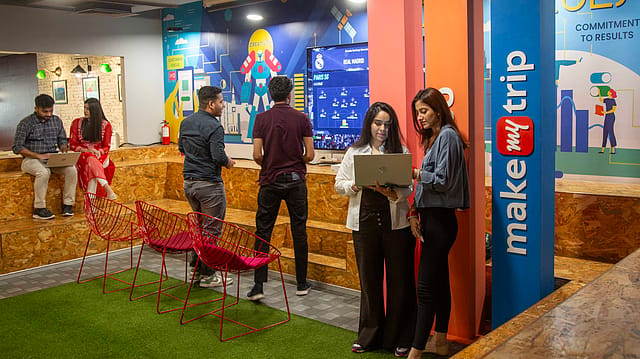How MakeMyTrip pivoted from flight platform to travel super app
ADVERTISEMENT

The travel industry is back with a vengeance after the COVID-19 pandemic. Like most travel and hospitality companies which languished during the pandemic, India's first travel tech company, MakeMyTrip (MMT) also witnessed a 95% slump in business. It's total gross bookings had dipped to $1.63 billion in FY21 from $6 billion in FY20. Rajesh Magow, co-founder of MakeMyTrip, says that the travel tech company during the pandemic focused on pivoting into a travel tech super app.
Essentially a flight booking platform, MakeMyTrip from 2012 onwards was already trying to build its hotel business. Unlike airlines, hotels are an extremely fragmented business and it took years for MMT to get its act together. Though India has over 2 million hotel rooms, only 20% are orgranised (owned by chains such as Taj Hotels, Oberoi or Radisson). "Bulk of the room inventory is independent hotels, spread across the country. It is owned by an individual and not a chain. We had to build tools so that they could come on our platform, give their inventory, their pricing and do revenue management on a real-time basis. We had to invest in onboarding them and get them onto our technology platform," explains Magow.
The hotel business is a high-margin business (upwards of 15%-20%), unlike airlines which offer wafer-thin margins to aggregators. Therefore, Magow was clear that hotels are what would drive profitability. Also, there was competition coming up (from the likes of Cleartrip, Yatra, EaseMyTrip) which made its dependence on air-ticketing unviable. "With capital coming in, competition was acquiring traffic at poor unit economics," says Magow. In 2016 MMT acquired Goibibo, a hotel-focused business, which also owned bus ticketing platform, RedBus. Goibibo was more in the budget and value space while MMT was stronger in the middle and premium segment hotels.
Today, hotels contribute 40% to MMT's overall revenue, while its dependence on airline ticketing is reduced to 35%. World over, the likes of Booking.com or AirBnB are focused on hotels and homestay aggregation, which gives higher margins and better profitability. MMT in FY23 saw a topline growth of $6.5 billion, from $1.5 billion in FY20. From a loss of $70 million, the company's profits have increased to $70 million in FY23. "In the first quarter of FY24, we did a gross booking of $2 billion and a profit of $30 million. Whatever pent up growth had to happen, it happened in FY24, now it's all about sustaining that growth," points out Magow.
While hotel aggregation has played out well for the travel platform, a considerable portion of its revenue has come from the B2B side of its business. During the pandemic, MMT built platforms such as myBiz (a corporate business platform for small and medium enterprises) and My Partner, a platform for travel agents. Under myBiz, the company has acquired Quest2Travel which offers travel solutions to 300 corporates. Magow claims that myBiz has 40,000 SMEs as clients.
MMT has also launched MyAffiliate, an open API platform, through which payment companies like Amazon Pay, Google Pay and PhonePe are offering travel services on their respective platforms. "It's a wallet on top of wallets with a view to get more and more users to use their customer app. They have a large customer base as they are penetrating into the country, so we thought it would be a good idea to power their travel use case." The B2B solutions launched soon after the pandemic receded, already contributing 12% to the overall business, claims Magow.
When the company acquired Ibibo in 2016, the acquisition also comprised RedBus, the bus ticketing platform. MMT has now made RedBus its ground travel offering, with verticals such as RedRail. "The same people who would book buses would also book trains. Rail customers also give us new users," explains Magow. MMT has also added intercity cab facilities as well as airport transfers as part of its ground travel offering.
Magow is confident that the exponential growth of the travel industry post the pandemic is here to stay. "If you look at India euphoria, whether it is GDP growth or inflation under control or investments happening on capex, new airports coming, ground transport infra expanding, from a long-term perspective the fundamentals are in place. Also, people are now wanting to spend more, especially the younger population. They are taking short weekend breaks. In fact, every long weekend is a new peak for us." A recent EY report also projects the Indian travel market to be a $1 trillion economy in the next couple of years. The report projects the travel industry to grow by 13% year on year for the next three years.